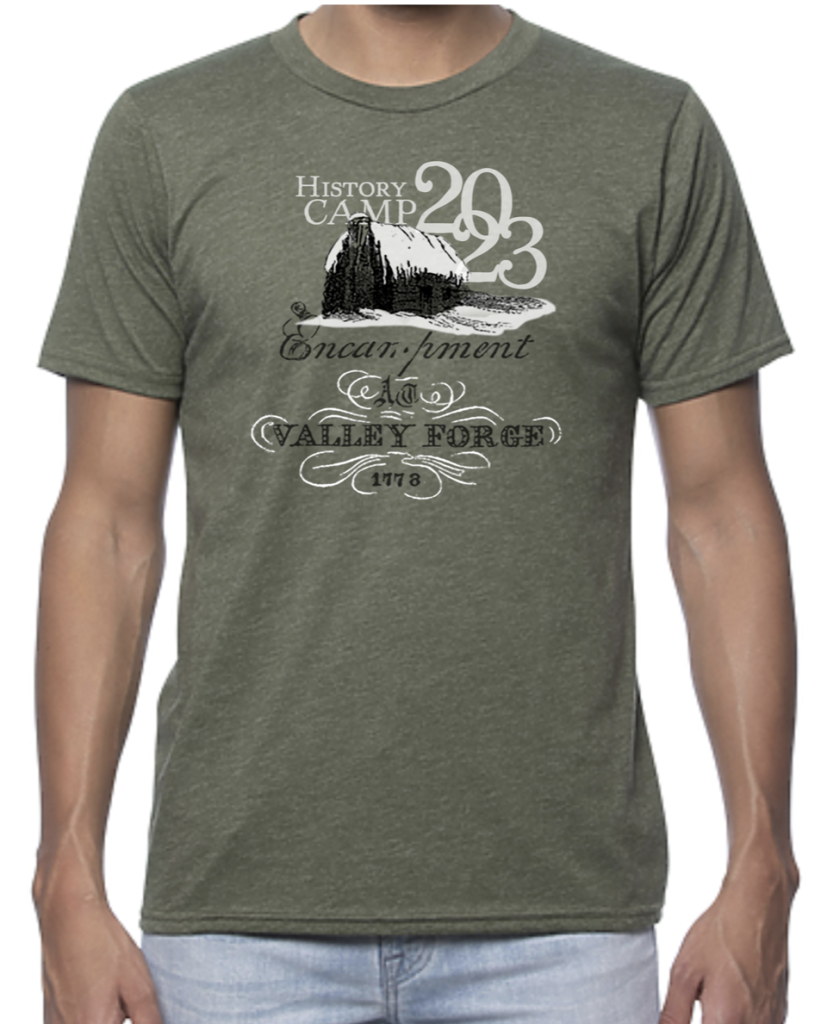
History Camp Valley Forge 2023
Note that Friday, Saturday, and Sunday events are separate tickets.
| Post-event updates | Updated June 14: View photos from Friday, Saturday, and Sunday |
| Date | Saturday, May 20, 2023 |
| Location | The Martha Washington Building, Freedoms Foundation at Valley Forge 1601 Valley Forge Road, Phoenixville, PA 19460 Directions, transportation, and lodging information |
| Registration | Closed |
| Lodging | Arrange your own lodging. We have blocks at two hotels. More information here. |
| Official 2023 t-shirt | History Camp Valley Forge 2023 t-shirt (left). (Must be ordered when registering.) |
| Doors open | 8:00 am — Light welcome breakfast (Included with your registration.) |
| Exhibits and vendors open | 8:00 am — Learn more about exhibiting and selling merchandise at History Camp. |
| History Camp sessions | 9:00 am – 5:30 pm |
| Lunch | 12:15 pm–1:15 pm — Lunch, soft drinks and coffee/tea (Included with your registration.) |
| Saturday night gathering (optional) | Some folks like to get dinner together after History Camp and are considering gathering at Black Powder Tavern at 1164 Valley Forge Rd, Wayne, PA 19087. (Note that individuals will be responsible for their own food and drink.) |
| For presenters | Details on presenting at History Camp Valley Forge |
Friday and Sunday Special Events
Note that Friday, Saturday, and Sunday events are separate tickets.
| Friday special event Requires a separate ticket. |
The Pursuit of History: Forging the Continental Army Requires a separate ticket. Register for Friday’s event here. |
| Sunday tours Requires a separate ticket. |
Two tour options in either Philadelphia or Valley Forge — Includes bus transportation. Limited number of tickets available. Requires a separate ticket which can be added when you register for History Camp. |
Sponsor
| Friday, Saturday, and Sunday | Thanks to Lorna Hainesworth for her financial support of The Pursuit of History: Forging the Continental Army, History Camp Valley Forge, and Touring Revolutionary Philadelphia. |
| Contact us to learn more about how you can sponsor History Camp Valley Forge and support the mission of The Pursuit of History, the non-profit organization that is creating and presenting these three days at Valley Forge as well as weekly, monthly, and annual programs that engage adults with history and new and exciting ways. — Lee and Carrie |
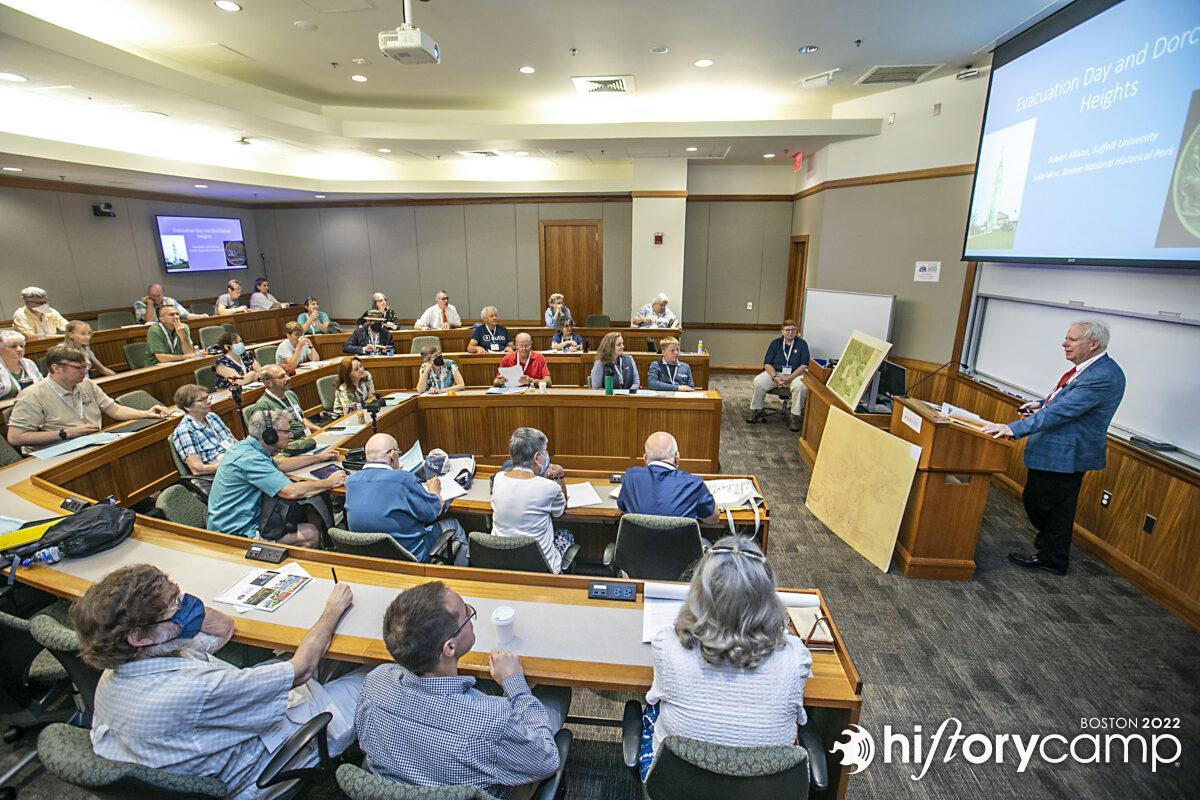
History Camp Valley Forge 2023—Sessions
New sessions will be added periodically. If you are interested in presenting, you’ll find more information on our Call for Presentations page.
The Philadelphia Bible Riots of 1844
Michael Troy (mtroy.history@gmail.com), host of American Revolution Podcast (pod.amrevpodcast.com and blog.amrevpodcast.com)
In 1844 Philadelphia Catholics from Ireland complained about the use of Protestant Bibles in their neighborhood schools. In response, Nativist Philadelphians marched through immigrant neighborhoods resulting in a multi-day riot. A few months later, the violence flared up again when a Catholic Church received state recognition as a militia. Burned homes and churches as well as artillery fire in the streets of Philadelphia led to major reforms.
Before Penn: A History of the Delaware River Colonies from 1609 to 1682
Hal Taylor (HalTaylorIllustration.com and Facebook) is the author of BEFORE PENN: An Illustrated History of the Delaware River Colonies, 1609-1682, and THE ILLUSTRATED DELAWARE RIVER: The History of a Great American River. He has been a graphic artist for more than 30 years, recently combining a love of history and art.
While searching for a short cut to the treasures of the Far East, navigator Henry Hudson finds potential value of a different sort in the Mid-Atlantic region of North America. As a result, his employers, the Dutch, establish New Netherland, and a lucrative a fur trade with the indigenous people of the region. They are soon challenged by a Swedish enterprise, which establishes a colony on the fringe of Dutch holdings on the Delaware. An English splinter group from New England arrives with similar intentions, and a competition ensues that lasts until the Dutch seize control of New Sweden. A similar fate later befalls the Dutch when the English take over all of the Eastern Seaboard.
Meanwhile in England, a religious movement called the Society of Friends takes root, much to the disdain of the British government. William Penn, the son of Admiral Sir William Penn, and Society of Friends follower, strikes a deal with the Duke of York in which he acquires a huge parcel of real estate in the New World in lieu of back pay owed his late father. Penn encourages a mass exodus of his religious friends to the future states of New Jersey and Pennsylvania, and eventually arrives himself, to found The City of Brotherly Love.
This is a wonderful opportunity to learn about an underserved period of our region’s history.
Investigating a Queer WWI Love Story
Virginia Kopacki is an MA student at Johns Hopkins University in Museum Studies. Her work focuses on the history of sexuality and gender and how museums can liberate hidden lives from the historical record. Virginia works as the Museum Education Coordinator at the Peter Wentz Farmstead in Lansdale, PA.
This presentation looks at a well-known biography about WWI called Testament of Youth by Vera Britain. Adapted to TV and film screens, this story is one of the most famous memoirs from the Great War years. However, all adaptations–including the original biography–intentionally hide that two of the key figures in the story, including Vera’s brother Edward, were actually gay and in a secret relationship. This knowledge alters the interpretation of Testament of Youth while also offering a unique opportunity to learn about LGBTQ lives a century ago.
The Three Things You May Not Know (and Should) About Dolley Madison
Jerry Landry (presidenciespodcast@gmail.com), is the host and producer of the Presidencies of the United States, a history podcast devoted to exploring each presidency from the very beginning in depth (https://www.presidenciespodcast.com). Jerry brings to his work extensive experience in scholarly research, data analysis, and effective strategies for teaching and learning.
Dolley Madison is one of the most well-known First Ladies, but her place in the public mind is largely based on myths and legends (i.e. her supposed fondness for oyster ice cream). The facts of her life and legacy are full of much more interesting details than the stories that have sprung up over the years and leave us with much that is worthy of study and remembrance. As History Camp is occurring on the anniversary of her birth, it is the perfect opportunity to better understand this historical figure.
In this presentation, those in attendance will learn about why Dolley Madison was important in her time, particularly with her role in the Jefferson and Madison presidencies, and what lessons she provides for people in the present day.
Slavery, Abolition and Seeking Freedom in Pittsburgh
Shawn MacIntyre (smacintyre@braddocksbattlefield.org) grew up with a love for history, while most children were watching cartoons, he was watching documentaries on various historic topics. He is an active re-enactor with Captain William Trent’s Company (a Virginia militia unit) based in Pittsburgh. He is also a Norse re-enactor/ medievalist in the Society for Creative Anachronism. Shawn has a Master’s Degree in American History, with a focus on 18th Century history. Shawn is the Public Engagement and Operations Manager of the Braddock’s Battlefield History Center in North Braddock PA, just outside of Pittsburgh.
While the Pennsylvania colony was among the first to reject slavery, people were still enslaved inside the state well into the 1800s. This program will focus on the Pittsburgh area, who were the slave holders? Who were the Abolitionists? How did people escape slavery and find freedom in the Pittsburgh area. While the focus will be on Pittsburgh, some information will be shared regarding other people and sites in the region that are related to slaveholders, abolition and the path to freedom.
Madison v. Hamilton
Bil Lewis (Presidentmadison.weebly.com), is a Computer Scientist and has worked in research and taught most of his life, most recently doing Genetics Research at the Broad Institute of MIT. He has taught at Stanford and Tufts Universities, subbed in Somerville, and worked in R&D at Sun Microsystems, FMC, and Nokia. Bil is a Past District Governor for Toastmasters, is an Eagle Scout, Returned Peace Corps Volunteer, and a Concerned Citizen.
James Madison and Alexander Hamilton worked closely together to build a nation. They are the two primarily responsible for the Constitutional Convention. They wrote the Federalist in close cooperation. They walked down Maiden Lane together day after day, talking about the nature on man and politics.
Yet they came to be strong political adversaries.
Bil Lewis (in costume as James Madison) would like to discuss this interesting division with the members of the audience. He shall speak for some time on his memories and concerns regarding his old friend, then turn to the audience for their thoughts.
General Nathanael Greene and the American Revolution
Salina Baker (SalinaBBaker.com, Twitter: @salinabbaker, Instagram: @salinabbaker, salina.beth.baker@gmail.com), is the author of a multiple award winning adult historical fantasy series about the American Revolution, Angels and Patriots. Her novel in progress about General Nathanael Greene titled The Line of Splendor, A Novel of Nathanael Greene and the American Revolution is currently under edit and targeted for a late 2023 release. Salina holds a degree in Computer Science.
Major General Nathanael Greene was a Quaker with little education or military experience who rose to become one of George Washington’s best battlefield commanders and heir apparent if something happened to Washington during the war. Faced with the difficulties of quartermaster general that led to battles with the Continental Congress, his fortitude saved the Continental Army from starvation. Where other generals failed, he succeeded in commanding the Southern Army and with his brilliant strategy, drove the British from their outposts to their final surrender at Yorktown, Virginia. But what did it cost this general from Rhode Island?
Subverting the Hessians: How the Continental Congress Tried to Convince German-Speaking Mercenaries to Desert
Nancy Parode holds a MA in American History and has taught U.S. History for eight years. She has long been fascinated by the colonial and revolutionary periods. Nancy has explored topics ranging from the myth of the Edenton Ladies’ Tea Party to the lives of women printers and publishers of the revolutionary era. Her current research focuses on the lives and deaths of enslaved and free Black people who labored for Jesuit priests in Maryland.
When Britain hired thousands of German-speaking contract soldiers (the “Hessians”) to fight against rebellious American colonists, Patriots were horrified. In response, the Continental Congress attempted to persuade Hessian soldiers to desert and join the Continental Army. George Washington, John Adams, Benjamin Franklin, and other Patriot leaders devised a series of propaganda schemes to convince the Hessians, particularly prisoners of war, to join the cause of Liberty. But just how well did these plans work?
This presentation delves into the Patriots’ efforts to demoralize the Hessians and explores the British and German-speaking military leaders’ counter-efforts. Along the way, we will take a closer look at who the “Hessians” really were, why they fought alongside British soldiers, and how they responded to Congress’ disinformation schemes.
“A Republic, If You Can Keep It”: Franklin’s Warning and How It’s Been Misused
J. L. Bell (Boston1775.net) is the author of “The Road to Concord: How Four Stolen Cannon Ignited the Revolutionary War,” as well as numerous articles, book chapters, and reports on aspects of the American Revolution. His website offers daily doses of history, analysis, and unabashed gossip about Revolutionary America. Bell has spoken at Mount Vernon; the American Revolution Institute in Washington, D.C.; Morristown National Historical Park; the Fraunces Tavern Museum; a score of historic sites in New England; and every edition of History Camp Boston.
According to an oft-retold anecdote, at the end of the Constitutional Convention in 1787 a woman asked Benjamin Franklin what the result was. “A republic,” he replied, “if you can keep it.” This talk looks at the evidence for that exchange, as recorded by another convention delegate in Philadelphia. It then traces how that anecdote has been distorted in the retelling, starting with that delegate’s own newspaper essays in the early republic and blossoming in the twentieth century. As a result, we have lost sight of the circumstances of the conversation, the accomplished woman Franklin spoke with, and the real political concern they shared.
No History, No Future. Know History, Know Future.
Jenny L. Cote (www.epicorderoftheseven.com) is the award-winning author of the historical fantasy fiction series, Epic Order of the Seven®. Likened to C. S. Lewis, she speaks on creative writing and history with her passion for making history fun for kids of all ages. Her research has taken her to most Revolutionary sites in the U.S., to London (to write in Handel’s composing room), Oxford (to stay in the home of C. S. Lewis), Paris, Normandy, and Rome. She created Epic Patriot Camp with the NPS to excite kids about history, research, and writing. Jenny has been featured by FOX NEWS on Fox & Friends and local Fox Affiliates, as well as numerous Op-Ed pieces on FoxNews.com. A Virginia native, Jenny now lives in Roswell, Georgia.
History isn’t just what it used to be. It’s gotten old. It isn’t taught, revered, or given the attention it used to receive in America’s educational landscape. So what will happen to our future if we lose our past? Author Jenny L. Cote will share a report card for history education as well as anectodal results from “The State of America’s History” survey of kids, parents, teachers, authors, historians, and even a governor on what they know and think. Take a quick pop quiz to see how you fare as well. Jenny will unpack how to make history fun, relevant and come alive for the next generation so they will not only know their history, but they’ll know their future.
Feeding Washington’s Army
Ricardo A. Herrera, PhD (https://usarmywar.academia.edu/RicardoHerrera) is Visiting Professor in the Department of National Security and Strategy, US Army War College, Carlisle Barracks, Pennsylvania, and an award-winning author. He is the author of Feeding Washington’s Army: Surviving the Valley Forge Winter of 1778 (Chapel Hill: University of North Carolina Press, 2022); For Liberty and the Republic: The American Citizen as Soldier, 1775-1861 (New York: New York University Press, 2015); and of numerous articles and chapters. Herrera was Professor of Military History at the School of Advanced Military Studies, US Army Command and General Staff College, Fort Leavenworth, Kansas. A graduate of Marquette University (PhD, 1998) and the University of California, Los Angeles (1984), Herrera was previously a historian on the Staff Ride Team, US Army Combined Arms Center at Fort Leavenworth, and taught at Mount Union College and Texas Lutheran University. He has also served as an armor and cavalry officer in the US Army.
In this major new history of the Continental Army’s Grand Forage of 1778, award-winning military historian Ricardo A. Herrera uncovers what daily life was like for soldiers during the darkest and coldest days of the American Revolution: the Valley Forge winter. Here, the army launched its largest and riskiest operation—not a bloody battle against British forces but a campaign to feed itself and prevent starvation or dispersal during the long encampment. Herrera brings to light the army’s herculean efforts to feed itself, support local and Continental governments, and challenge the British Army.
Highlighting the missteps and triumphs of both General George Washington and his officers as well as ordinary soldiers, sailors, and militiamen, Feeding Washington’s Army moves far beyond oft-told, heroic, and mythical tales of Valley Forge and digs deeply into its daily reality, revealing how close the Continental Army came to succumbing to starvation and how strong and resourceful its soldiers and leaders actually were.
Is he really buried there? Searching for the graves of the Signers of the Declaration of Independence
Jennifer Epstein Rudnick knew she wanted a career in history after being inspired by her fifth-grade teacher. She grew up in northwestern Connecticut and earned a Bachelor of Arts from Gettysburg College. She has worked for the National Park Service at several sites, and for more than 20 years, has been on the National Mall in Washington, DC, hoping to inspire the next generation of historians like her teacher did for her. She lives in Northern Virginia with her husband and enjoys reading, traveling, baseball, and spending time with her niece and nephew.
What started out as a quirky hobby soon became an obsession. During a road trip with friends to Boston, in a cemetery with three Declaration signers graves, a project was born, traveling to and photographing the graves of the 56 signers of the Declaration of Independence. As the search continued, more questions arose. A number of Declaration signers were not interred in their original burial locations or perhaps in unmarked graves. Hear some of the unusual stories of signers who were moved from their original burial places and whether all 56 were found.
Roads to Valley Forge: The Whitemarsh Encampment and the Battle of Whitemarsh
Bob Bradley (https://www.historichopelodge.org/) is a tour guide and volunteer with Historic Hope Lodge in Fort Washington, PA where he was awarded PA Historical and Museum Commission’s site Volunteer of the Year in 2019. He also served of the Board of Directors with local historical societies and is a member of the American Revolution Round Table of Philadelphia. He continues to enjoy learning everything he can about the Revolutionary era.
Bob will give an overview of the events in the fall of 1777 following the Battle of Germantown to the march into the winter camp at Valley Forge.
Having lost two major battles within twenty three days, the Continental Army was utterly exhausted and needed rest and resupply. George Washington and the army spent the following weeks attempting to resupply and make their way closer to British occupied Philadelphia, all while figuring out their next move.
Find out what happened during a lesser known chapter of the Philadelphia Campaign with the army’s encampment in the hills of Whitemarsh, PA and General William Howe’s attack on the Continental position in early December.
The United States Colored Troops in the Civil War
William E. Fischer, Jr., is a retired United States Air Force officer and National Park Service historian and supervisory park ranger, currently residing in Scranton PA. Bill was also an Air Force Junior ROTC senior instructor in central Ohio, being recognized as the Veterans of Foreign Wars 2007 Citizenship Education Teacher of the Year for Ohio, and served on the faculty of the United States Air Force Academy History Department. Bill earned a Master of Arts degree in American History Since 1877 from the University of Georgia, did doctoral work at Ohio State, and is the author of numerous articles, encyclopedia entries, a monograph entitled, The Development of Military Night Aviation to 1919, as well as having presented at national and regional history conferences.
Arming African American men was one of the most contentious issues of the American Civil War, and sparked a civil rights movement that fundamentally changed the nation. Although black sailors had served in both the US Navy and on merchant vessels before secession, only abolitionists favored including men of color in organized militia, state, or federal land forces following the surrender of Fort Sumter. Local threats led to early enlistment of free blacks and even conscription of the formerly enslaved “contrabands of war.” However, as warfare lingered and casualties mounted, manpower became ever more critical, resulting in the formal creation of the United States Colored Troops. Ultimately, the able service of more than 175,000 African American soldiers helped turn the tide to Union victory in 1865.
James K. Polk: Most effective One-Term Ever?
Jeff L. Scott, Ph.D. is Vice President of Education at Freedoms Foundation in Valley Forge, PA. In his educational career, he has taught history at the elementary, middle, and high school levels, as well as an adjunct at the university level. Jeff is currently writing the book Oscar Visits Valley Forge. In the recent past, Dr. Scott has participated in the George Washington Teacher Institute and the White House Teacher Institute as well as present at the National Council for the Social Studies conference in Philadelphia, PA.
We will look at the presidency of James K. Polk. In our time together we will explore his presidential goals of reestablishing the Treasury System, reducing tariffs, acquiring land in the Oregon Country as well as California. Did he accomlish his goals? Was he successful? Was he the best president ever in the United States based on goals and accomplishments? Come find out and decide for yourself.
The “Copperhead” Clement Vallandigham
Roger W. Arthur has had an interest in American history all his life. He studied it it in college, taught it in school and traveled the country learning about it first hand, visiting every state in the Union. After retiring early from industry, he followed his passion, returned to school and earned a Masters in U.S. History. In all he has twenty years as a classroom teacher and over thirty as a lecturer at universities, libraries, clubs, civic groups and during the Pandemic he prepared and delivered a ZOOM series, “History for the Fun Of It,” on his website.
This is the true story of Edward Everett Hale’s “Man Without a Contry.” Clement Vallandigham was Southern sympathizing Ohio Congressman who lost his 1862 bid for reelection. He became a martyr to get nominated for governor. He gave aspeech which violated a military order. He was arrested, tried by military commission, convicted, and banished by Lincoln to the Confederates. He escaped and was nominated for governor of Ohio.
Managing America’s First Air Force: Lincoln, His Generals, and the Civil War Balloon Corps
Michael J. Mercadante earned his BA in History from Temple University, and his MS in Psychology from Capella University. He works as a professional genealogist and a teacher. His research focuses on American history from the colonial era to the present, with special interest in the psychological biographies of historical figures and the interpretations of historical persons and events in popular culture.
This session will include an overview of the use of gas balloon aircraft as part of the Union Army during the American Civil War, as well as an examination of the roles various Union generals played in the successes and failures of the novel combat program.
George Washington and Leadershift
David Cross is the CEO of “Indispensable Leadership,” which is a Leadership Development company that offers training and consultation based on historical teachings. David is the author of “Indispensable: Learning to Succeed and Lead Like George Washington,” which won the Goldwinner Nonfiction Book Award. David also owns “Bow Tie Tours,” the premier historical tour company in Philadelphia which offers tours of the city as well as battlefield tours of Valley Forge, Brandywine, Washington’s Crossing, Monmouth, and Gettsyburg.
Many people have written about George Washington’s leadership abilities, but rarely has anyone discussed the quality that made his leadership so unique, which was his ability to gauge new situations and to create a leadership style specifically suited for the particular circumstance. I will discuss the four distinct leadership styles that Washington employed for four different situations.
Riflemen show the way-Ferguson’s Experimental Corps of Riflemen prove their tactics and weapons prowess at the Philadelphia Campaign, 1777
David Dalrymple is a long-time closet history nerd who delves into Colonial and American Revolution Military History. He has been a passionate researcher into Major Patrick Ferguson, his weapons, activities, and his various commands during the AWI. Dave’s aim is to publish a book on the Unit Histories of Ferguson’s commands and a focused look at Patrick Ferguson’s activities during the AWI as well as an in-depth look at the various models of the Ferguson rifle. Dave is an award-winning author in his career field of Emergency Services which he has spent the last 40 years. He is the Educator/Rescue Consultant for RoadwayRescue LLC based in Annandale, NJ.
After their first taste of battle shortly after their arrival in Staten Island at the close of the Forage war in Central NJ, during the spring of 1777 and the Battle of Short Hills in June of 1777, Captain Patrick Ferguson and his Corps of Riflemen embarked with Major General Howe’s army heading south with aim of capturing the capital of the newly founded United Colonies at Philadelphia.
We will see Ferguson and his Riflemen in the vanguard as Howe moves north from the Head of the Elk. They will see steady action from Coochs Bridge, Kennett Square, and with Gen. Knyphausen at Chadds Ford during the Battle of Brandywine. The last action the Corps of Riflemen serve together was the night raid at Paoli without their Captain who was severely injured during the Battle of Brandywine.
In telling more of Ferguson’s tale we will tell you about some new facts that have been uncovered that sheds new light onto Ferguson and his Corps of Riflemen.
A Soldier’s Perspective at Valley Forge-a performance
Kyle Jenks (jaktar773@aol.com) is a professional interpreter of President James Madison. He moved to Philadelphia for “the sole and express purpose” of portraying Mr. Madison in the First Person during multiple stages in his life. He is the creator of the Society Hill Walking Tour in Philadelphia, given in character as Congressman Madison, newly wed to the Widow Todd. He also is a playwright, penning and peforming in the two person stage production: James and Dolley: Opposites Attract. He is a member of The League of Most Interesting Gentlemen. You can follow him on Instagram (@madisonportrayer and @leaguemostinterestinggentlemen)and Facebook.
Capitalizing on new research, Kyle has probed the Valley Forge experience to new depths. With a performance based presentation, he will give you a visceral as well as an educational experience of what an enlisted soldier went through during that six month encampment. Common myths will be clarified and the challenges of Valley Forge intensified and magnified using this multi-sensory presentation style.
The Threshold to Valley Forge: The Gulph Mills Encampment from December 12, 1777 to the March to Valley Forge, December 19, 1777
Sheilah Vance, Esq. (sdvesq@gmail.com)grew up on Rebel Hill in Gulph Mills, Pennsylvania and resides in Washington, DC. She has written and presented extensively about the Philadelphia Campaign of the Revolutionary War. She is the author of the article, Valley Forge’s Threshold: The Encampment at Gulph Mills, in the Journal of the American Revolution; the award-winning novel, Becoming Valley Forge; and the e-book, Six Days in December: General George Washington’s and the Continental Army’s Encampment on Rebel Hill and Gulph Mills, December 12 – 17, 1777. A practicing attorney and higher education administrator, Vance presented on African American Participation in the Philadelphia Campaign and the Valley Forge Encampment of 1777-1778 at the Valley Forge National Park Service and Association for the Study of African American Life and History Spring 2021 Symposium and on the relationship between the Continental Army’s March Out of Valley Forge on June 19, 1778 and Juneteenth, June 19, 1865, at the 2022 Juneteenth Program for the Federal Energy Regulatory Commission. She is currently working on a nonfiction book about the Gulph Mills Encampment to be published in 2024.
William Trego’s iconic painting, The March to Valley Forge, encapsulates the state of General George Washington and the Continental Army after they encamped in the towering hills of Gulph Mills, Pennsylvania, seven miles from Valley Forge, from December 12, 1777 to December 19, 1777. Known as the Threshold to Valley Forge, the Gulph Mills Encampment is often forgotten or minimized. Yet, the Gulph Mills Encampment was a significant microcosm of the Revolutionary War. It included encounters with the British and the local community; little food, clothing, and shelter for the troops; the celebration of the new nation’s first Thanksgiving, and tough decisions by Washington, including his momentous decision to make Valley Forge the army’s winter quarters. Based largely on writings from the encampment, this presentation will cover the fascinating details about George Washington’s and the Continental Army’s last stand before and as they moved into winter quarters at Valley Forge.
The Patriotic Order Sons of America and their role in saving Washington’s Headquarters at Valley Forge
Scott M. Shultz (yeshultz@comcast.net) is a retired educator with a degree in Social Studies and Special Education. He has always had a special interest in history and patriotism, fostered by his mentor, colleague and friend, the late Lester Breininger of nationally-famed Breininger Redware Pottery and avid historian, who encouraged Scott to join the Patriotic Order Sons of America (POS of A) in 1990. Scott has served in various officer positions in his local POS of A Camp 113 Bernville, Berks County, Pa, as well as serving as former President of the Berks County POS of A organization, the PA State Camp, and the National Camp. He currently serves on the board of Washington Camp 150 of the Valley Forge Commission, the original POS of A Camp of the Valley Forge area, which continues to maintain the POS of A building “Patriot’s Hall” in Valley Forge National Park.
Donald R. Borkey (posofaoffice@aol.com) is a 53-year member of the Patriotic Order Sons of America (POS of A) and has held numerous officer positions from Treasurer to President in his local Washington Camp 446 Centreport, Berks County, Pa, and in the Berks County organization, the PA State Camp and the National Camp. He currently serves as the National Secretary of the POS of A, headquartered in Leesport, Pa. Donald also serves as secretary of Washington Camp 150 of the Valley Forge Commission which continues to maintain the POS of A building “Patriot’s Hall” in Valley Forge National Park.
This session will cover the very beginnings of Valley Forge Park that started with one group’s desire to preserve Washington’s Headquarters a hundred years after the Continental Army’s occupation at Valley Forge. That group, the Centennial and Memorial Association of Valley Forge, was headed by Mrs. Anna Holstein, who enlisted the help of the Patriotic Order Sons of America (POS of A). The Centennial and Memorial Association was then reorganized with POS of A members and Holstein’s original group of dedicated women. With that help, the purchase of Washington’s Headquarters was secured, additional adjoining land was purchased, and artifacts were procured. This single desire to preserve Washington’s Headqaurters evolved into the Valley Forge National Park we enjoy today.
Savannah’s Braveheart: Georgia’s Unsung Hero of the American Revolution and Beyond
Aaron Bradford (libertyencounters@gmail.com, https://www.libertyencounters.com/, Instagram – @libertyencounters Facebook –facebook.com/libertyencounters) discovered a passion for history when he learned that he is a direct 14th generation descendant of Plymouth Colony Governor William Bradford. For the past 25 years, Aaron shared a love for history from the Era of Jamestown through the American Civil War at historic sites, educational venues, and in historical films. After earning a B.A. in History Education from the University of Delaware, Aaron served as an Educator and Historical Interpreter at Pamplin Historical Park near Petersburg, Virginia. He is the Social Media Assistant for the Society of Mayflower Descendants in the State of Delaware. He serves as the Interpretive Supervisor with Coastal Heritage Society and offers engaging tours and educational programs as Liberty Encounters in Savannah, Georgia, and nearby historic sites.
As a 17 year old Englishman arriving in Savannah in 1772, James Jackson joined the Liberty Boys and never looked back. Until his death in 1806, he proved his devotion to American Liberty on several pivotal battlefields of the American Revolution, in the halls of the Georgia and U.S. Capitals, and on many dueling grounds as the Avenging Angel of Corruption. Learn why Major General Jackson’s lasting words were, “If you cut out my heart, you will find Georgia engraved upon it.” Learn how Major General Jackson personified the sacrifices and struggles of young Georgia to make a tremendous contribution to our Nation.
Hope Lodge, the Whitemarsh Encampment, and the Philadelphia Campaign of 1777
Jeffrey LaMonica, M.Phil. is Associate Professor of History and Global Studies Program Coordinator at Delaware County Community College in Media, PA and Site Coordinator of Historic Hope Lodge in Fort Washington, PA.
The Continental Army’s encampment at Whitemarsh was the final phase of the 1777 Philadelphia Campaign during the American War for Independence. Eleven thousand Continental troops constructed camps and fortifications along the hills around Whitemarsh. Historic Hope Lodge served as headquarters for Surgeon General John Cochran. General George Washington used his time at Whitmarsh to decide whether to retake Philadelphia from the British or go into winter quarters at Valley Forge. This choice would shape the outcome of war.
Middlebrook Encampments: Washington’s Winters Before and After Valley Forge
Paul F. Soltis, MLitt is the New Jersey State Park Service’s historian for Wallace House & Old Dutch Parsonage State Historic Sites in Somerville. Wallace House was George Washington’s winter headquarters for the 1778-79 Middlebrook Cantonment and Old Dutch Parsonage is historic home of the founder and first president of Rutgers, the State University of New Jersey. Mr. Soltis has studied at William & Mary, Colonial Williamsburg, and Aberdeen.
Before and after the iconic encampment at Valley Forge, George Washington and the Continental Army camped at Middlebrook in central New Jersey. This session introduces Gen. Washington’s encampments at Middlebrook in spring 1777 and winter 1778-79, exploring them in consideration of the Continental Army’s intervening winter at Valley Forge to understand the course of the Revolutionary War through this period.
In addition to an overview of these encampments, this session introduces the major sources and recent scholarship as well as surviving historic sites and active historical organizations involved in preserving and interpreting the Continental Army’s Middlebrook encampments for a new generation in prepration for the 250th anniveraries of the American Revolution.
Pilgrim to Patriot: The Forefather’s Impact on the Nation’s Founding
David M. Bradford is a 12th generation direct descendant of Plymouth Governor William Bradford and a life member of the Delaware Mayflower Society where he has served as Newsletter editor, Counsellor, Education Chair, and two-terms as Governor. David is currently an Education Committee member of the General Society of Mayflower Descendants and executive board member of the Plymouth Rock Foundation in Plymouth, MA. Since 2013 David has been portraying Governor William Bradford and sharing his first-hand account of Pilgrim history with schools, senior centers, and historical societies in DE, PA, and MD. In 2021 he portrayed Gov. Bradford at the American Pilgrimage 400 celebration held in Plymouth, MA.
The Pilgrims of Plymouth have long been viewed as a global, iconic symbol of America’s foundational values of faith, freedom, and virtue. Is there a valid basis for this observation? To what extent do the facts and events of Pilgrim and early Native American histories justify their significance to America’s founding?
Examine the evidence for the Pilgrim’s long-held distinction as the spiritual ancestors and forerunners of the American Republic. David will open the historical record and explore these important questions and how the founder’s vision and foundational values, deemed as essential to this new nation by the founders themselves, were embodied in the values and character of their Plymouth forefathers. The presentation includes primary source, first-person accounts from Pilgrim Governor William Bradford.
Correcting the Files for Ben Franklin’s 1754 JOIN, or DIE Artwork
Benjamin Franklin’s 1754 “JOIN, or DIE.” artwork was an important political cartoon used in unifying the colonies leading up to the French and Indian War and later adapted for the Revolutionary War. We will explore inaccuracies in documenting the history of the image. Through our work, files have been corrected at the Library of Congress, Historical Society of Pennsylvania, PBS, Wikipedia, Franklin Institute, Pennsylvania and Connecticut Historical Societies and numerous colleges. We are currently working on correcting the display at the Valley Forge National Park Visitor’s Center. Did you know Pennsylvania started with an R?
(Sessions are added as they are received. A preliminary schedule will be posted roughly a week before the event and a final schedule will be published the evening before and distributed that morning.)
Thank You
Thank you to the Freedoms Foundation for the use of their facilities for History Camp Valley Forge and their support and encouragement as we have put together this special day.
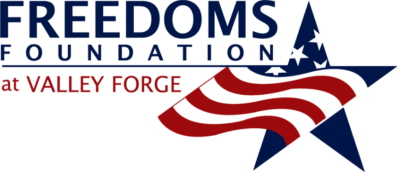
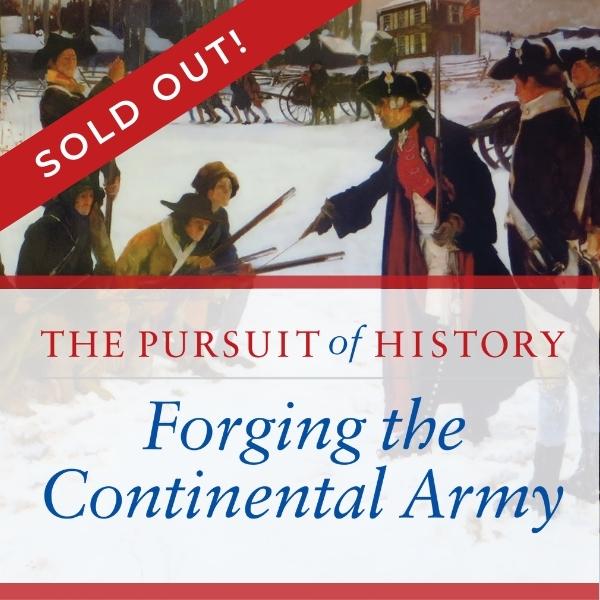
FRIDAY, MAY 19, 2023
The Pursuit of History: Forging the Continental Army
[ SOLD OUT! ]
An unparalleled opportunity to spend a day with noted authors and historians and a small group of discerning history lovers—held in and around Valley Forge National Historical Park. Includes sessions, tours, lunch, and dinner.
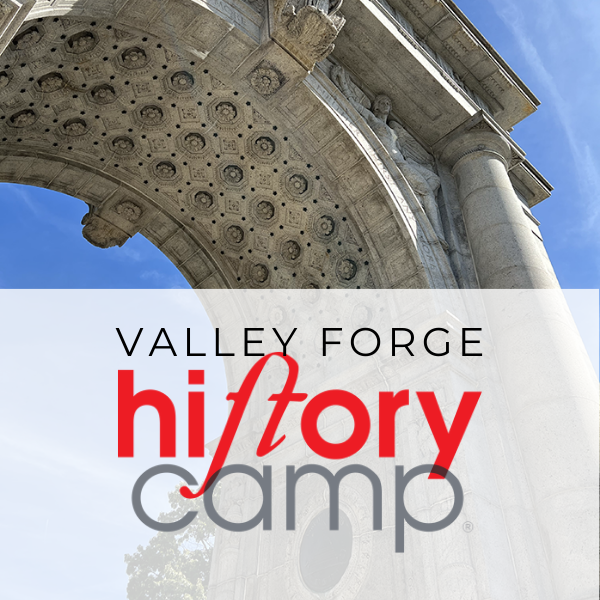
SATURDAY, MAY 20, 2023
History Camp Valley Forge
Our first-ever History Camp in Pennsylvania welcomes history lovers of all stripes and interests to the engaging, fun History Camp experience you know and love.
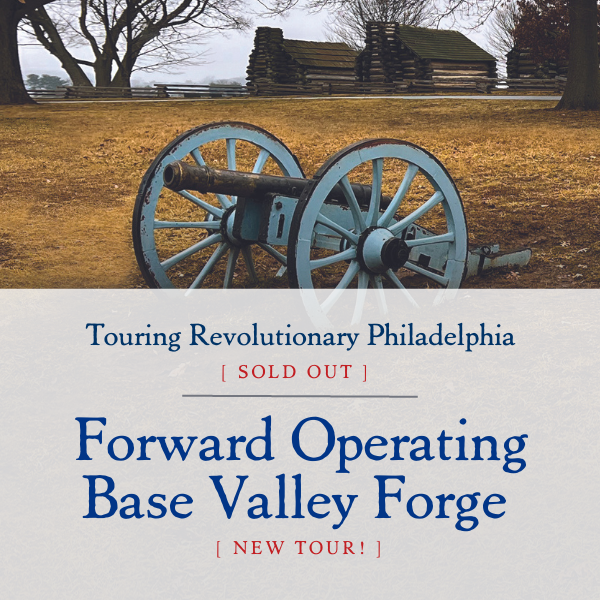
SUNDAY, MAY 21, 2023
Forward Operating Base Valley Forge: George Washington’s Armed Camp on the Schuylkill
[ SOLD OUT! ]
Travel by bus with Rick Herrera for a tour focused on the military strategy and tactics of Washington’s encampment at Valley Forge.
Touring Revolutionary Philadelphia
[ SOLD OUT! ]
Valley Forge 2023 Title Sponsor
Thank you to Lorna Hainesworth for her generous financial support of The Pursuit of History: Forging the Continental Army, History Camp Valley Forge, and Touring Revolutionary Philadelphia.
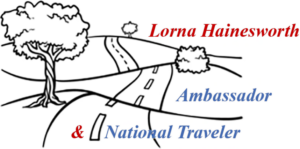
Interested in becoming a Sponsor?
Contact us to learn more about how you can support the mission of The Pursuit of History, the non-profit organization behind History Camp whose online and in-person programs engage adults with history.
Sign up to receive weekly updates
History Camp is a project of The Pursuit of History, the national the non-profit organization founded in 2019 that creates innovative ways to bring people together around history.
Sign up for updates on our weekly History Camp Author Discussions, monthly History Camp Outings, annual History Camp, and our Pursuit of History Weekends, which are unparalleled opportunities for a small group of people to dive deep into history where it happened in order to understand not just what happened, but why it happened.
Image Credits
Valley Forge National Historical Park (©2022 Lee Wright)

